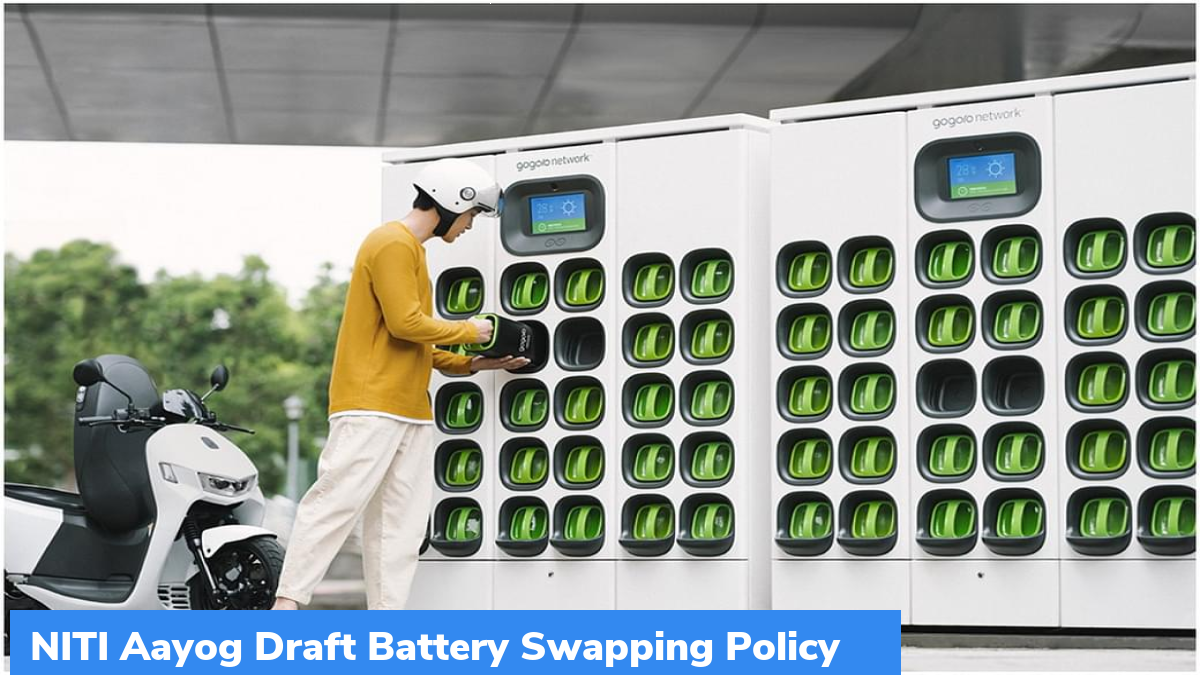NITI Aayog Draft Battery Swapping Policy
NITI Aayog released a draft battery swapping policy on 21st April 2022. Under this policy, all metropolitan cities in the country having a population over 40 lakhs will be given priority for the development of a battery swapping network under the first phase.
Overview:
- Also, under this policy, all major cities such as UT headquarters, state capitals, and cities having populations of more than 5 lakhs will be covered under the second phase, as two-wheeler and three-wheeler vehicle segments are important in growing cities.
- Nirmala Sitharaman had earlier during this year’s Union Budget announced that the central government will be rolling out a battery swapping policy to reduce the costs of purchasing Electric Vehicles (EVs).
Aim of this policy
The policy is aiming to support the adoption of battery-swapping, especially in battery swapping systems that are used in three-wheeler electric rickshaws and electric scooters.
Key Proposals made under this policy
- Under this policy, NITI Aayog has proposed to offer incentives to electric vehicles (EVs) having swappable batteries, subsidies will be provided to companies manufacturing swappable batteries, standards for interoperable batteries, and a new battery-as-a-service business model, etc.
- The GST Council has been suggested under this policy to consider reducing the tax rates on electric vehicle supply equipment and Lithium-ion batteries.
- The policy also proposes to extend the same incentives available to electric vehicles with fixed batteries to electric vehicles with swappable batteries.
- The government will also be specifying a minimum contract duration that has to be signed between EV users and battery providers to ensure that battery swapping services are provided after receiving the subsidy.
- Under this policy, the state governments will be required to ensure that the public battery charging stations receive EV power connections with concessional tariffs. The policy also proposes that such stations be subject to existing or future time-of-day (ToD) tariff regimes, allowing the swappable batteries to be charged during off-peak periods when the cost of electricity is low.
- State Transport Authorities and Transport Departments will be responsible for easing the registration processes for the vehicles that are sold without batteries or for the vehicles being sold with battery swapping functionality.
- The municipal corporations across the country will be responsible for providing zoning permissions, planning, and land allocation for battery swapping stations.
- A unique identification number (UIN) will also be provided to swappable batteries at the manufacturing stage so that they can be tracked and monitored. Also, each battery-swapping station will be assigned a UIN number.
- Battery-swapping stations will be installed at several locations like public parking areas, retail fuel outlets, Kirana shops, malls, general stores etc.
About Battery Swapping
It is a mechanism that involves the exchanging of discharged batteries for charged ones. Due to this, the batteries can be charged separately by de-linking battery usage and charging and keeping the vehicle in operational mode.
About battery-as-a-service model
Battery-swapping will fall under the battery-as-a-service (BaaS) business model. Such models will be ensuring interoperability between batteries and EVs for mainstreaming battery swapping as a successful alternative. Also, battery providers will be asked to sign data-sharing agreements so as to provide information on battery performance and health, as well as provide consumers more flexibility through peer-to-peer roaming networks.
Month: Current Affairs - April, 2022
Category: Government Schemes Current Affairs


